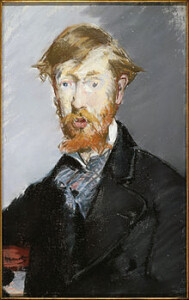 It’s always revealing to learn which books were the favourites of certain writers—and which books or writers were reviled. We know what Wyndham Lewis felt about the Bloomsbury set. It’s all in The Apes of God. It’s not a secret that Martin Amis worships Nabokov and Saul Bellow or that Kingsley Amis was a Janeite. The likes and dislikes of pre-modernist writers, however, tend to be less well known today, so it’s good to find someone expressing their secret admiration for a certain writer or a certain passage of prose or poetry.
It’s always revealing to learn which books were the favourites of certain writers—and which books or writers were reviled. We know what Wyndham Lewis felt about the Bloomsbury set. It’s all in The Apes of God. It’s not a secret that Martin Amis worships Nabokov and Saul Bellow or that Kingsley Amis was a Janeite. The likes and dislikes of pre-modernist writers, however, tend to be less well known today, so it’s good to find someone expressing their secret admiration for a certain writer or a certain passage of prose or poetry.
The Irish novelist George Moore is rather forgotten today, although academic interest in his work persists for some reason or other. We personally are not drawn to his books, but Moore was certainly a fan of Anne Bronte’s The Tenant of Wildfell Hall,as he admitted to his friend Edmund Gosse in a letter dated 28thApril, 1920, a typewritten copy of which we found interleaved in Evan Charteris’ Life and Letters.
After gladly accepting an invitation to dinner from Mrs Gosse, Moore declares that he is very excited at re-reading the novel he had first read at the age of twelve:
‘ never losing sight of it for half a century and more; it is the only book I read in my infancy that I remember; it fixed itself in my childish imagination, and my mature judgement has no hesitation in declaring it to be the cream of English fiction…the first half has all the merits that Miss Austin has and other merits besides…’
We will forgive Mr Moore the misspelling of Jane Austen’s name, but what follows comes as a greater surprise. Moore feels that the following passage from Bronte surpasses in its treatment of the internal and external world all the literature published by three great modern novelists:
‘ I have a very pleasant recollection of that walk, along the hard, white sunny road, shaded here and there with bright green trees, and adorned with flowery banks, and blossoming hedges of delicious fragrance; or through pleasant fields and lanes, all glorious in the sweet flowers and brilliant verdures of delightful May. It was true, Eliza was not beside me ; but she was with her friends in the pony-carriage, as happy, I trusted, as I was; and even when we pedestrians, having forsaken the highway for a short cut across the fields, beheld the little carriage far away, disappearing amid the green, embowering trees, I did not hate those trees for snatching the dear little bonnet and shawl from my sight , nor did I feel that all those intervening objects lay between my happiness and me’ for, to confess the truth, I was to (sic) happy in the company of Mrs Graham, to regret the absence of Eliza Milward –‘
To Moore this passage:
… reveals more perception of the world within us and the world without us and show (sic) how curiously these two worlds, the external and the internal, overlap and intermingle, than any passage that could be discovered however resolutely ( in) the works of Hardy, the Villager, Conrad the Sailor, or James the Eunuch…’
He then confesses that he had to get the subject off his chest, otherwise he might have made himself ‘a nuisance at dinner’. [RR]

James the Eunuch has to be Henry James!
Oliver St. John Gogarty doubted Moore’s own masculine credentials. He quoted Ausan Mitchell as saying “Some men kiss and tell, some men kiss and don’t tell, but George Moore tells and doesn’t kiss.”